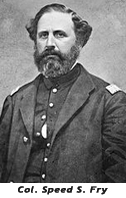|
Kentucky’s Civil War leaders…
Fry believed to have killed Zollicoffer
at Battle of Mill Springs; not true?
(EDITOR’S NOTE: This is the 24th in a series about Kentucky’s officers and battle leaders during the Civil War.)
Did Union Col. Speed S. Fry murder Confederate Gen. Felix Zollicoffer?
 There still is a debate about who actually killed the general at the Battle of Mill Springs, Jan. 19, 1862. There still is a debate about who actually killed the general at the Battle of Mill Springs, Jan. 19, 1862.
During the battle, the fighting became disorganized and Gen. Felix Zollicoffer, who was nearsighted, rode up to Fry’s regiment thinking they were Confederate troops. The general ordered them to stop firing and then Zollicoffer’s aide came riding from the woods and attempted to warn the general that he was in the midst of enemy soldiers.
The aide fired off a shot and Fry immediately raised his pistol and fired at Zollicoffer, who fell dead. Fry never specifically claimed he was the one who killed Zollicoffer, but many reports and paintings at the time give full credit to him. However, there were members from three different Union regiments standing near Fry who also fired.
Whether or not he was the sole person to shoot Zollicoffer was not in question by the Confederates. The Southerners were so outraged that they accused Fry of murder.
Fry never claimed he was the one who killed Zollicoffer, but many reports and paintings at the time give full credit to him. However, there were members from three different Union regiments standing near Fry who also fired.
A lawyer, judge and a United States Army officer during the Mexican-American War, Fry was born in Mercer County (now Boyle County) near Danville. He was graduated from Wabash (Ind.) College in 1840 and returned to Danville to practice law under his uncle. He served as a captain in the 2nd Kentucky Volunteer Regiment during the Mexican-American War and saw action at the Battle of Buena Vista, where his company fired the last shots of the battle.
After the war he returned home and was appointed a judge of Mercer County and served in that position until the Civil War. With the outbreak of the war, Fry was immediately made a colonel of the Kentucky Militia and helped raise the 4th Kentucky Infantry at Camp Dick Robinson. On Oct. 9, 1861, he was appointed colonel of the regiment and led it at Mill Springs.
On March 21, 1862, Fry was appointed brigadier general of volunteers and commanded the 2nd Brigade, 1st Division, in the Army of the Ohio. His brigade arrived at the Battle of Shiloh at the end of the second day, too late to participate in the fighting.
However, his brigade did participate in the siege of Corinth. Returning to Kentucky, he led his brigade into action at the Battle of Perryville. Once the Confederate forces had withdrawn from Kentucky, Fry took command of the 3rd Division, Center Wing, of the XIV Corps (Army of the Cumberland), which he led in the Stones River Campaign; he and most of his division were not engaged in the Battle of Stones River.
For much of the remainder of the war, he commanded the North Central Kentucky sub-district. At the close of the war, he was in command of Camp Nelson. He was mustered out of the service on Aug. 24, 1865, without being awarded the brevet rank of major general, which usually was bestowed automatically in the case of a brigadier general with Fry’s time in grade.
In 1866, Fry was an unsuccessful Republican candidate for Congress. He was the supervisor for Internal Revenue collection in his congressional district and was the superintendent of the Soldier’s Home and also an elder of the Presbyterian Church.
He died at age 74 near Louisville and is buried in the Bellevue Cemetery at Danville.
|







